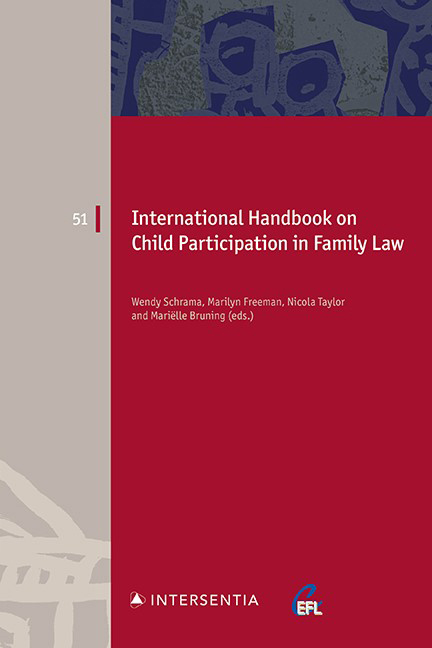Book contents
Australia
Published online by Cambridge University Press: 10 December 2021
Summary
INTRODUCTION
Australia is a large island continent with a relatively small population of approximately 26 million people. Children comprise just under 19% of the population, which is an aging one. Approximately one in four children will experience the permanent separation or divorce of their parents. Australia is an ethnically diverse nation with more than a quarter of the population born overseas. Approximately 3% of the population are Aboriginal or Torres Strait Islander.
Australia is a Federation, with six states and two territories. Pursuant to the Constitution, private family law matters (typically disputes between those having or seeking parental responsibility for children) are a Commonwealth responsibility and governed by the Family Law Act 1975 (Cth) (FLA). These matters are heard by the Family Court of Australia and the Federal Circuit Court of Australia (collectively ‘the family law courts’). Care and protection matters (disputes between the carers of a child and the state) and adoption are a state and territory responsibility and dealt with in Children's Courts, or in the case of adoption, in the Supreme Court in some states.
In private law matters, children may be consulted in the course of negotiations between their parents on the arrangements and the amount of time they will spend with each parent; they might be interviewed by a counsellor and their views fed back to their parents in the course of mediation; they might have their views included in a family report; and they might be involved in the trial process as well, at least through having an independent lawyer to represent them, and also (though uncommonly in Australia) by having the opportunity to talk with the judge.
STATUTORY PROVISIONS
Children's wishes or views have typically been one of the factors that courts are required to consider in many jurisdictions in making determinations about children's welfare. The family law courts have jurisdiction over children's living arrangements in the event of the divorce or separation of their parents, including relocation matters, and international child abduction. In determining a child's best interests under the FLA, the court is required to consider ‘any views expressed by the child and any factors (such as the child's maturity or level of understanding) that the court thinks are relevant to the weight it should give to the child's views’.
- Type
- Chapter
- Information
- International Handbook on Child Participation in Family Law , pp. 89 - 102Publisher: IntersentiaPrint publication year: 2021



